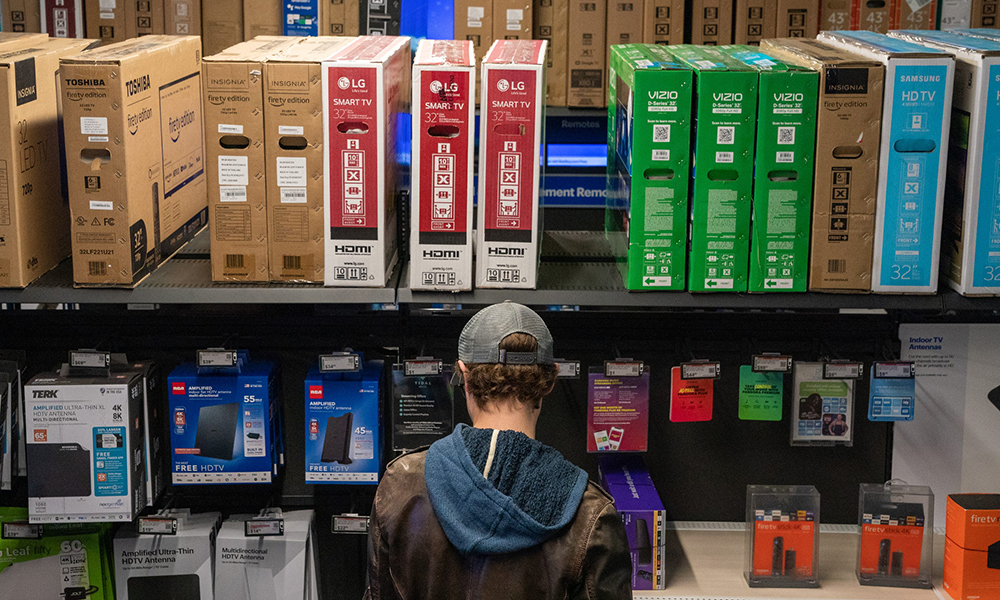
尽管近四分之一的美国成年人在使用ChatGPT,也有成千上万家公司将人工智能融入其运营中,但许多消费者仍未消除对类似《终结者》中人工智能掌控一切的恐惧。这对于试图说服顾客购买其带有“人工智能”标签产品的品牌来说可能是个坏消息。
今年6月发表在《酒店营销与管理杂志》(Journal of Hospitality Market and Management)上的一项研究发现,如果产品被贴上“人工智能”的标签,消费者对购买该产品的兴趣就会降低。在一系列研究中,参与者被问及其购买意向,所涉及产品从电视到吸尘器,再到消费与健康服务等,且这些产品都被标注了“人工智能驱动”或“高科技”两种描述词之一。这项研究的作者之一、华盛顿州立大学(Washington State University)卡森商学院酒店管理教授多甘·古尔索伊(Dogan Gursoy)说,在大约200名不同年龄和性别的参与者中,人工智能标签对消费者购买意愿的影响是一致的。
古尔索伊告诉《财富》杂志:“在每一个案例中,每当我们提到'人工智能'与'高科技'时,消费者的购买意愿都会下降。”
事实上,根据高知特(Cognizant)对1000名美国消费者的调查,购物者在很大程度上受到了人工智能的威胁,仅有30%的受访者表示信任生成式人工智能。近四分之三的受访者认为生成式人工智能将提高企业利润,而28%的受访者认为,与企业、小企业、员工和政府相比,生成式人工智能给消费者带来的益处最少。
古尔索伊表示,品牌在很大程度上高估了消费者对人工智能的信任程度,他的研究为此论断提供了支撑。当消费者在情感上对人工智能的信任度较低时(情感信任是决定购物者是否购买产品的关键因素),他们对标注“人工智能驱动”的产品的购买意愿也较低。对于参与者认为风险较高的商品,如汽车,其购买意愿和情感信任都较低。
身份威胁和生存恐惧
古尔索伊说,对许多消费者来说,围绕人工智能的焦虑源于该技术带来的身份威胁。人工智能取代人类的恐惧(Z世代担心他们的工作会被这项技术取代)仍然十分突出。
古尔索伊说:“它威胁到了我的身份,还威胁到了人类的身份。任何事物都不应比我们更聪慧。”
消费者对隐私的担忧加剧了这些恐惧,根据思科公司(Cisco)的《2023年消费者隐私调查》,大多数消费者表示,由于各大组织使用该技术,他们对人工智能的信任已被侵蚀。立法者也做出了相应的反应:深度伪造视频和音频内容的泛滥导致马萨诸塞州总检察长安德里亚·坎贝尔(Andrea Campbell)对人工智能敲响了警钟,警告使用该技术的公司必须遵守该州的消费者保护和数据隐私法规。亚马逊(Amazon)在全食超市(Whole Foods)使用的掌纹扫描支付系统引发了网络安全专家的担忧。
“任何时候,当你把数据托付给一家私人公司时,就是在信任这家公司会保障数据安全。而大多数时候,你可能不应该这样做。”科技监管倡导组织Fight for the Future负责人埃文·格里尔(Evan Greer)在接受美国全国广播公司财经频道(CNBC)采访时表示。
Amazon Web Services首席信息安全官克里斯·贝茨(Chris Betz)在六月份的一篇博文中表示,该公司在继续投资生成式人工智能的同时,也在优先考虑安全问题。
无人能处理得当
由于人们已经对人工智能产生了不信任感,因此生产和宣传人工智能驱动产品的品牌面临着一场艰苦的战斗。古尔索伊说,需要说服消费者让其相信人工智能在特定产品中的好处:“很多人都会问,为什么我的咖啡机需要人工智能,或是为什么我的冰箱或吸尘器需要人工智能?”
他认为,唯一的问题在于,尚无公司能够成功运用这一策略。
古尔索伊说:“公司在这类信息传达方面做得不够到位。所有人都对人工智能的发展或相关情况守口如瓶,这是可以理解的。但消费者也需要知晓他们的数据是安全的。”
为了说服消费者购买那些宣扬人工智能效用的产品,品牌首先需要消除消费者对这项技术的担忧。这意味着企业要阐明产品如何通过人工智能技术实现效用,并提高数据使用的透明度。
古尔索伊说:“总有人不愿接受这一点,但对于大部分消费者来说,我们需要引导他们的想法。”(财富中文网)
译者:中慧言-王芳
尽管近四分之一的美国成年人在使用ChatGPT,也有成千上万家公司将人工智能融入其运营中,但许多消费者仍未消除对类似《终结者》中人工智能掌控一切的恐惧。这对于试图说服顾客购买其带有“人工智能”标签产品的品牌来说可能是个坏消息。
今年6月发表在《酒店营销与管理杂志》(Journal of Hospitality Market and Management)上的一项研究发现,如果产品被贴上“人工智能”的标签,消费者对购买该产品的兴趣就会降低。在一系列研究中,参与者被问及其购买意向,所涉及产品从电视到吸尘器,再到消费与健康服务等,且这些产品都被标注了“人工智能驱动”或“高科技”两种描述词之一。这项研究的作者之一、华盛顿州立大学(Washington State University)卡森商学院酒店管理教授多甘·古尔索伊(Dogan Gursoy)说,在大约200名不同年龄和性别的参与者中,人工智能标签对消费者购买意愿的影响是一致的。
古尔索伊告诉《财富》杂志:“在每一个案例中,每当我们提到'人工智能'与'高科技'时,消费者的购买意愿都会下降。”
事实上,根据高知特(Cognizant)对1000名美国消费者的调查,购物者在很大程度上受到了人工智能的威胁,仅有30%的受访者表示信任生成式人工智能。近四分之三的受访者认为生成式人工智能将提高企业利润,而28%的受访者认为,与企业、小企业、员工和政府相比,生成式人工智能给消费者带来的益处最少。
古尔索伊表示,品牌在很大程度上高估了消费者对人工智能的信任程度,他的研究为此论断提供了支撑。当消费者在情感上对人工智能的信任度较低时(情感信任是决定购物者是否购买产品的关键因素),他们对标注“人工智能驱动”的产品的购买意愿也较低。对于参与者认为风险较高的商品,如汽车,其购买意愿和情感信任都较低。
身份威胁和生存恐惧
古尔索伊说,对许多消费者来说,围绕人工智能的焦虑源于该技术带来的身份威胁。人工智能取代人类的恐惧(Z世代担心他们的工作会被这项技术取代)仍然十分突出。
古尔索伊说:“它威胁到了我的身份,还威胁到了人类的身份。任何事物都不应比我们更聪慧。”
消费者对隐私的担忧加剧了这些恐惧,根据思科公司(Cisco)的《2023年消费者隐私调查》,大多数消费者表示,由于各大组织使用该技术,他们对人工智能的信任已被侵蚀。立法者也做出了相应的反应:深度伪造视频和音频内容的泛滥导致马萨诸塞州总检察长安德里亚·坎贝尔(Andrea Campbell)对人工智能敲响了警钟,警告使用该技术的公司必须遵守该州的消费者保护和数据隐私法规。亚马逊(Amazon)在全食超市(Whole Foods)使用的掌纹扫描支付系统引发了网络安全专家的担忧。
“任何时候,当你把数据托付给一家私人公司时,就是在信任这家公司会保障数据安全。而大多数时候,你可能不应该这样做。”科技监管倡导组织Fight for the Future负责人埃文·格里尔(Evan Greer)在接受美国全国广播公司财经频道(CNBC)采访时表示。
Amazon Web Services首席信息安全官克里斯·贝茨(Chris Betz)在六月份的一篇博文中表示,该公司在继续投资生成式人工智能的同时,也在优先考虑安全问题。
无人能处理得当
由于人们已经对人工智能产生了不信任感,因此生产和宣传人工智能驱动产品的品牌面临着一场艰苦的战斗。古尔索伊说,需要说服消费者让其相信人工智能在特定产品中的好处:“很多人都会问,为什么我的咖啡机需要人工智能,或是为什么我的冰箱或吸尘器需要人工智能?”
他认为,唯一的问题在于,尚无公司能够成功运用这一策略。
古尔索伊说:“公司在这类信息传达方面做得不够到位。所有人都对人工智能的发展或相关情况守口如瓶,这是可以理解的。但消费者也需要知晓他们的数据是安全的。”
为了说服消费者购买那些宣扬人工智能效用的产品,品牌首先需要消除消费者对这项技术的担忧。这意味着企业要阐明产品如何通过人工智能技术实现效用,并提高数据使用的透明度。
古尔索伊说:“总有人不愿接受这一点,但对于大部分消费者来说,我们需要引导他们的想法。”(财富中文网)
译者:中慧言-王芳
Despite almost a quarter of U.S. adults using ChatGPT and thousands of companies integrating artificial intelligence into their operations, many consumers haven’t ditched the fear of a Terminator-style AI takeover. That could be bad news for brands trying to convince customers to buy their AI-stamped products.
A study published in the Journal of Hospitality Market and Management in June found consumers were less interested in purchasing an item if it was labeled with the term “AI.” Across a series of studies, participants were asked about their intention to buy a product—from televisions to vacuums to consumer and health services—labeled with one of two descriptors, “AI-powered” or “high tech.” Among about 200 participants across age and gender demographics, the impact of AI labels on a consumer’s willingness to buy a product was unanimous, according to Dogan Gursoy, hospitality management professor at Washington State University’s Carson College of Business and one of the study’s authors.
“In every single case,” Gursoy told Fortune, “whenever we mentioned ‘AI’ versus ‘high tech,’ consumers’ purchase intention went down.”
Indeed, shoppers are largely threatened by AI, with only 30% of respondents saying they trust generative AI, according to a Cognizant survey of 1,000 U.S. consumers. Almost three-fourths of respondents believed genAI would increase corporate profits, and 28% believed genAI would benefit consumers the least compared to corporations, small businesses, employees, and the government.
Brands have largely overestimated consumer trust in AI, Gursoy said, and he has the research to support his claim. When consumers had lower emotional trust, a critical factor in determining if a shopper will buy a product, they also had low purchase intentions for products labeled “AI-powered.” Purchase intentions and emotional trust were lower for items participants considered higher risk, such as cars.
Identity threats and existential fears
For many consumers, the anxiety around AI stems from an identity threat the technology poses, Gursoy said. The fear of AI taking over humanity—exemplified in Gen Z’s fear of losing their jobs to the technology—is still salient.
“It threatens my identity, threatens the human identity,” Gursoy said. “Nothing’s supposed to be more intelligent than us.”
These fears have been exacerbated by consumer concerns over privacy, with most consumers saying their trust in AI has already been eroded by organizations using the technology, per Cisco’s 2023 Consumer Privacy Survey. Lawmakers are reacting accordingly: The proliferation of deepfake video and audio content caused Massachusetts Attorney General Andrea Campbell to sound the alarm over AI, warning companies that use the technology that they must abide by the commonwealth’s consumer-protection and data-privacy laws. Amazon’s use of a palm-scanning payment system at Whole Foods stores sparked concern from cybersecurity experts.
“Any time you entrust your data with a private corporation, you’re trusting that company to keep that data safe. And most of the time, you probably shouldn’t,” Evan Greer, director of tech regulation advocacy group Fight for the Future, told CNBC.
Amazon Web Services’ chief information security officer Chris Betz said in a June blog post the company is prioritizing security as it continues to invest in genAI.
No one’s getting it right
Since there’s already distrust toward AI, brands producing and advertising AI-powered products have an uphill battle ahead. Consumers need to be convinced of AI’s benefits in a particular product, Gursoy said: “Many people question, Why do I need AI in my coffee maker, or why do I need AI in my refrigerator or my vacuum cleaner?”
The only problem is that no company has been able to successfully tap into this strategy, he argued.
“Companies are not doing a great job of that kind of messaging,” Gursoy said. “Everyone is keeping the AI development or what’s going on with AI a secret, and that’s understandable. But consumers also need to know that their data is safe.”
In order for consumers to purchase items espousing the utility of AI, brands need to first assuage anxieties around the technology. That means companies spelling out the benefits of a product thanks to AI and increasing transparency practices around data usage.
“There are always people who will never want that,” Gursoy said. “But for a large portion of consumers, we need to nudge their mind.”






